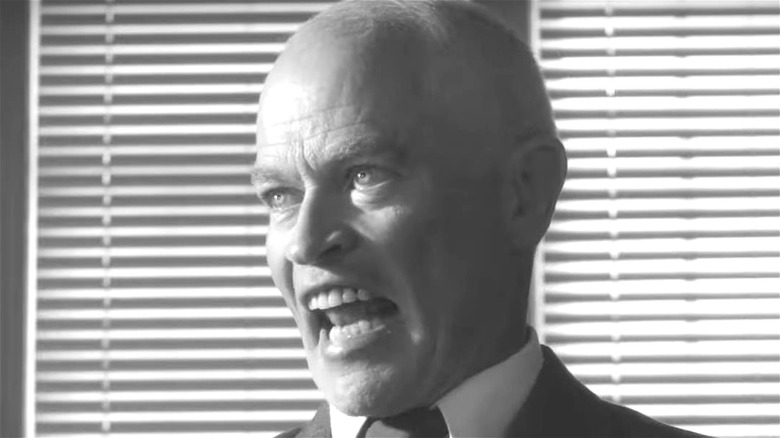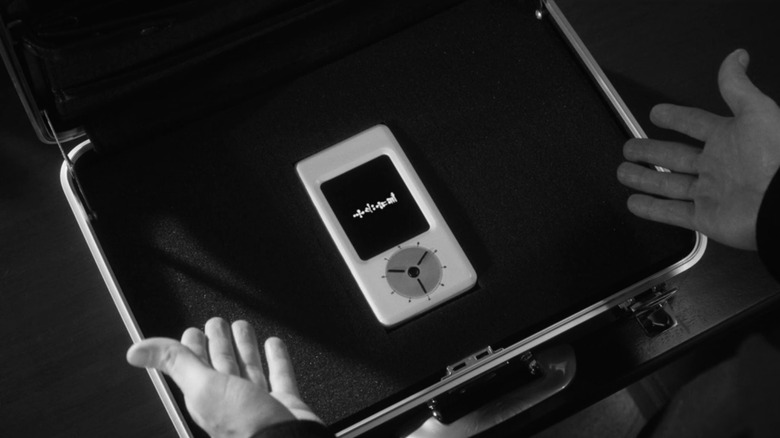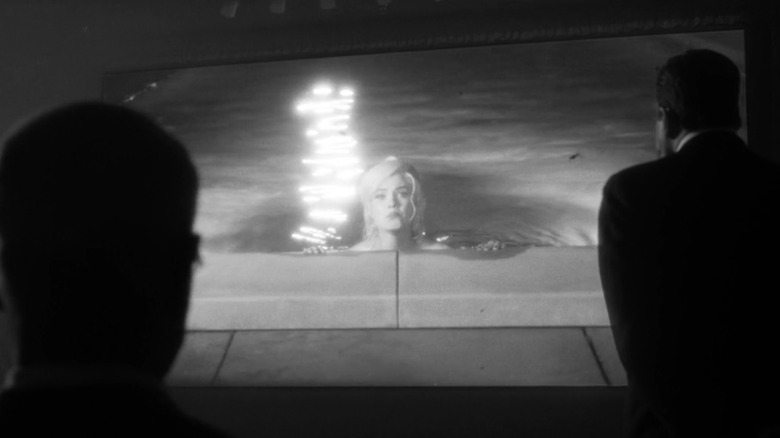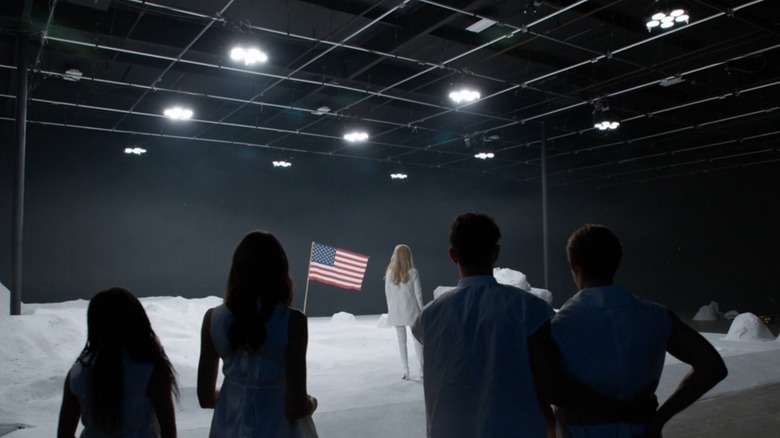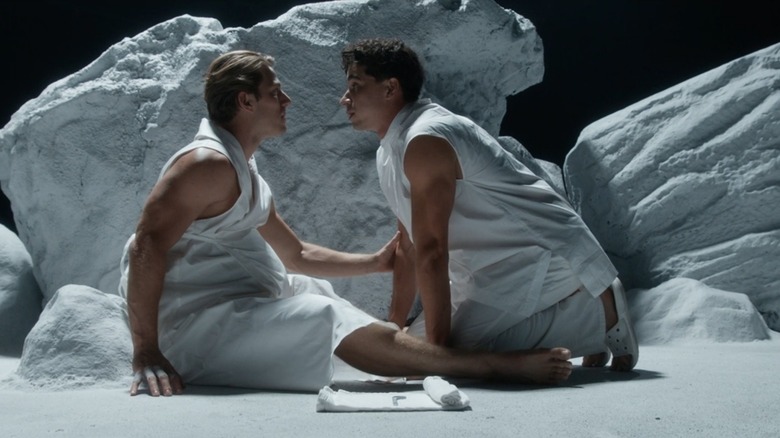The Ending Of American Horror Story: Double Feature Episode 9 Explained
Contains spoilers for "American Horror Story: Double Feature" Episode 9
The third and penultimate episode of "Death Valley," the second part of "American Horror Story: Double Feature," further explores the effect that the arrival of aliens in the 1950s had on mid-century American mythology.
In the 1950s, President Eisenhower (Neal McDonough) continues to fret over his decision to surrender a certain number of American lives in exchange for advanced alien technology. His concerns grow considerably when he gets his own first-hand tour of one of the alien research facilities. This leads Eisenhower to create one of the most often referenced yet seldom visited sites in the United States and, in the process, launch a thousand conspiracy theories.
For President Eisenhower, the horror that his subjects endure after being taken by the aliens was only experienced second-hand. But for our group of friends in the present day, that nightmare is viscerally real. After giving birth to his own part human, part alien baby Troy (Isaac Powell) has a realization about his life. It's one that gives him the courage to try and mount an escape from his captors, but will it work?
Here's what happened in "Blue Moon," the third episode of "American Horror Story: Death Valley."
The alien tech isn't all it's cracked up to be
Three years after Eisenhower reluctantly signed the treaty with the aliens, a robotic ambassador named Valiant Thor (Cody Fern) arrives at the White House bearing a gift that will look quite familiar to those of us living in the modern era.
Val opens a suitcase and reveals a small electronic device that looks a bit like an early version of an iPod. The robot refers to it as "a computing device you can hold in the palm of your hand." Of course, Eisenhower and his advisors are amazed at this technology, even more so when Val tells them what it will do. "One day," he explains, "these devices will connect your world and usher in an age of peace and harmony among mankind."
Here, Val appears to be alluding to the rise of cell phones and smartphones. He is right that the technology is impressive and offers humanity the ability to be more connected. However, as viewers who live in the very age that the character is predicting, we know that smartphones have not actually ushered in a new epoch of peace and harmony.
This new technology is pitched as something that is inherently good or, at least, will produce a net positive for humanity. Considering Eisenhower and his advisors continue to embrace the alien tech, they seem to believe so, as well. But as "Death Valley" has demonstrated throughout its short run, those who pushed for the deal with the aliens in the 1950s did not understand what they were unleashing on the world. The tech they received did lead to extraordinary advancements, but as this cell phone scene demonstrates, those advancements do not necessarily correlate to positive outcomes.
The death of Marilyn Monroe and birth of Area 51
Another recurring thread of "Death Valley" has been an exploration of 20th century American mythology. From the JFK (Mike Vogel) assassination to the disappearance of Amelia Earhart (Lily Rabe), the show has used its conceit of this soft alien invasion as an explanation for many prominent mysteries.
Last episode, we speculated that in addition to JFK, Marilyn Monroe's (Alisha Soper) death would also be attributed to her knowledge of the secret alien treaty. "Blue Moon" confirms that to be true. In the 1960s, Eisenhower and Richard Nixon (Craig Sheffer) watch footage of Monroe splashing around in a swimming pool while she openly talks about the aliens. This footage is a reference to the film Monroe had been working on and was then fired from shortly before her death. Titled "Something's Got to Give," the movie was never actually completed, but raw footage of Monroe filming in a pool has become the stuff of Hollywood legend (via The Independent). After Eisenhower and Nixon get a look at the footage, we see government agents descending on Monroe's home to force a handful of pills into her mouth.
"Blue Moon" also gives us the origins of Area 51, the highly classified government facility in the Nevada desert that has long been associated with conspiracy theories about extraterrestrials. The episode shows Eisenhower signing the paperwork to create the site after discovering that the aliens are using a nuclear bunker under the White House to run their experiments. Wracked with guilt about the human cost of his treaty, Eisenhower wants the experiments to be conducted as far away as possible. Once Mamie (Sarah Paulson) gives him the idea to relocate the facility to the Nevada desert, Area 51 is born.
Oh, and Stanley Kubrick directed the moon landing
The revelation about Area 51 provides us with a convenient explanation for where Kenny (Kaia Gerber), Cal (Nico Greetham), Troy (Isaac Powell), and Jamie (Rachel Hilson) are being held. It also gives the show an opportunity to explore yet another popular American conspiracy theory.
After Troy's traumatic birth experience (we'll circle back to that), Calico (Leslie Grossman) approaches and tells the group the story of how she came to live at Area 51. Her tale also includes details of how the US government faked the moon landing. Calico shows them the very set that was used to replicate the surface of the moon and even reveals that Stanley Kubrick (Jeff Heapy) directed the whole thing.
Calico explains that the government faked the moon landing out of convenience (going to the moon itself would have been expensive and time-consuming, after all). They wanted an event that would prime the public for the technological advancements that would soon start trickling into the mainstream thanks to the alien treaty. Otherwise, the rapid development might lead people to become suspicious. Or, as Calico puts it, "If you start giving people velcro and computers, they're going to start asking questions."
In classic "American Horror Story" fashion, these revelations are part intriguing alternate history that explores what is really at the heart of so many of the stories we cling onto as a culture, and part excuse to dress actors up as ex-Presidents and have a little fun. The moon landing portion does tie in nicely to the exploration of Kenny's Luddism from Episode 1, specifically the fact that she has become jaded by rapid technological advancement. Looks like the government's plan to ease the public into this new era didn't work on everyone.
Cal and Troy welcome a little bundle of horror
Last week's episode left off with Troy on the verge of giving birth. Thanks to some alien tech and a little telepathic communication, he ends up mostly physically unharmed by the process but leaves his birthing suite quite emotionally damaged when his alien-human hybrid baby is euthanized shortly after drawing its first breath.
Troy expresses extreme sadness about the child's death when he's returned to his friends. He and Cal reveal that they've been thinking more and more seriously about starting a family of their own. Although he was obviously scared for his life going into his delivery, once Troy saw his child, he became profoundly emotionally attached to it. How much of this sudden paternalism can be attributed to the extreme circumstances they are all in is unclear, but Troy and Cal are now dead set on keeping the next hybrid baby that comes their way.
The couple gets their chance when Cal begins to go into labor himself. Troy secrets him away to the moon landing set and performs an amateur c-section that is miraculously successful. However, when the couple uncovers their writhing bundle of joy, they also get a rude reminder that they are in way over their heads. The child Cal births is human on top, but horrifying face-hugger octopus monster on the bottom, and the episode ends with it attaching itself to Cal's face.
It's a tough start to their journey as parents and considering next week is the season finale, we're going to guess that said journey will have a rough ending, as well.
